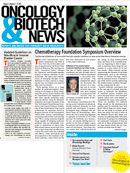Sorafenib (Nexavar) Becomes First and Only Approved Treatment of Hepatocellular Carcinoma in Europe
The European Commission has granted marketing authorization to sorafenib (Nexavar) for the treatment of patients with hepatocellular carcinoma (HCC), the most common form of liver cancer. Nexavar, an oral anticancer drug, is the first approved systemic therapy for HCC and the only one shown to significantly improve overall survival in patients with the disease.
Click here to view as PDF.
Sorafenib (Nexavar) Becomes First and Only Approved Treatment of Hepatocellular Carcinoma in Europe
On November 1, the European Commission granted marketing authorization to sorafenib (Nexavar) for the treatment of patients with hepatocellular carcinoma (HCC), the most common form of liver cancer. Nexavar, an oral anticancer drug, is the first approved systemic therapy for HCC and the only one shown to significantly improve overall survival in patients with the disease. Additional regulatory filings for HCC are under review in countries around the world including the United States and Japan. Nexavar is currently approved in more than 60 countries for the treatment of patients with advanced renal cell carcinoma.
HCC is the third-leading cause of cancer death worldwide. Most patients with HCC die within one year of diagnosis. No standard therapy exists for advanced HCC. Sorafenib is a multikinase inhibitor with antiangiogenic, proapoptotic and Raf kinase—inhibitory activity.
The efficacy and tolerability of sorafenib in patients with advanced HCC was demonstrated most recently in the Phase III SHARP (Sorafenib HCC Assessment Randomized Protocol) trial.1 The SHARP trial evaluated the efficacy and safety of sorafenib in 602 patients with advanced HCC and no history of previous systemic therapy. Enrollees were randomized to receive either sorafenib 400 mg bid (N=299) or placebo (N=303). At baseline, most subjects (82% and 83% in the sorafenib and placebo groups, respectively) had BCLC Stage C disease. Patients treated with sorafenib lived 44% longer than those who received placebo (median survival, 10.7 vs 7.9 months). Median time to progression was also longer in sorafenib-treated patients than in those who received placebo (5.5 vs 2.8 months). The study was considered so successful that it was halted earlier this year and patients in the placebo group were offered sorafenib. The most common side effects with sorafenib were diarrhea in 11% of patients, fatigue in 10%, and swelling in the hands and feet in 8%.
Based on these data, a supplemental New Drug Application for Nexavar was granted Priority Review status by the U.S. Food and Drug Administration in August. These data, along with Phase-I safety data, were submitted as part of a Marketing Authorization Application in Japan.
Sorafenib targets both the tumor cell and tumor vasculature. In preclinical studies, sorafenib has been shown to target members of two classes of kinases known to be involved in both cell proliferation (growth) and angiogenesis (blood supply)—two important processes that enable cancer growth. These kinases included Raf kinase, vascular endothelial growth factor receptor (VEGFR)-1, VEGFR- 2, VEGFR-3, platelet-derived growth factor receptor (PDGFR)-B, KIT, FLT-3 and RET. Preclinical models have also demonstrated that Raf/MEK/ERK has a role in HCC; hence, blocking signaling through Raf-1 may offer therapeutic benefits in HCC.
—John Zoidis, MD
2007;25(suppl):Abstract LBA1.
1. Llovet J, Ricci S, Mazzaferro V, et al: Sorafenib improves survival in advanced hepatocellular carcinoma (HCC): Results of a Phase III randomized placebo-controlled trial (SHARP trial). J Clin Oncol
